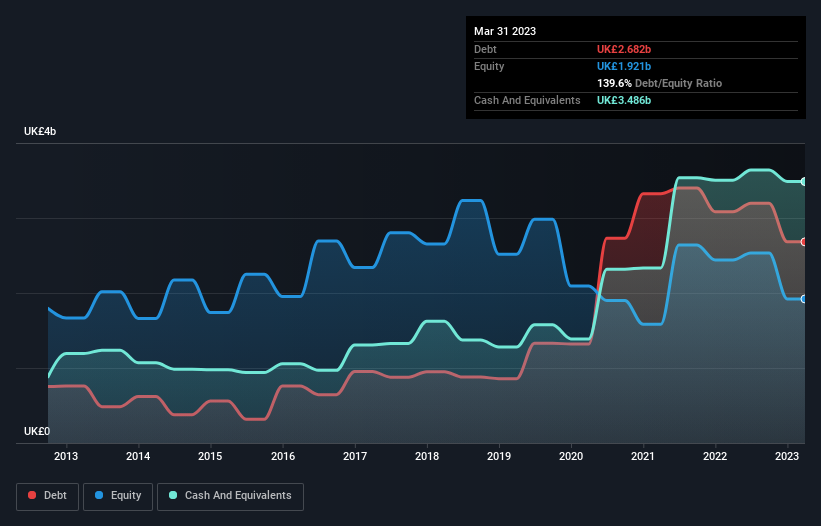- United Kingdom
- /
- Airlines
- /
- LSE:EZJ
These 4 Measures Indicate That easyJet (LON:EZJ) Is Using Debt Extensively
David Iben put it well when he said, 'Volatility is not a risk we care about. What we care about is avoiding the permanent loss of capital.' When we think about how risky a company is, we always like to look at its use of debt, since debt overload can lead to ruin. Importantly, easyJet plc (LON:EZJ) does carry debt. But is this debt a concern to shareholders?
When Is Debt A Problem?
Debt assists a business until the business has trouble paying it off, either with new capital or with free cash flow. In the worst case scenario, a company can go bankrupt if it cannot pay its creditors. While that is not too common, we often do see indebted companies permanently diluting shareholders because lenders force them to raise capital at a distressed price. Of course, debt can be an important tool in businesses, particularly capital heavy businesses. The first thing to do when considering how much debt a business uses is to look at its cash and debt together.
See our latest analysis for easyJet
What Is easyJet's Debt?
As you can see below, easyJet had UK£2.68b of debt at March 2023, down from UK£3.08b a year prior. But it also has UK£3.49b in cash to offset that, meaning it has UK£804.0m net cash.

How Strong Is easyJet's Balance Sheet?
According to the last reported balance sheet, easyJet had liabilities of UK£5.02b due within 12 months, and liabilities of UK£3.60b due beyond 12 months. Offsetting this, it had UK£3.49b in cash and UK£373.0m in receivables that were due within 12 months. So its liabilities outweigh the sum of its cash and (near-term) receivables by UK£4.76b.
When you consider that this deficiency exceeds the company's UK£3.25b market capitalization, you might well be inclined to review the balance sheet intently. In the scenario where the company had to clean up its balance sheet quickly, it seems likely shareholders would suffer extensive dilution. Given that easyJet has more cash than debt, we're pretty confident it can handle its debt, despite the fact that it has a lot of liabilities in total.
We also note that easyJet improved its EBIT from a last year's loss to a positive UK£85m. When analysing debt levels, the balance sheet is the obvious place to start. But ultimately the future profitability of the business will decide if easyJet can strengthen its balance sheet over time. So if you want to see what the professionals think, you might find this free report on analyst profit forecasts to be interesting.
Finally, a company can only pay off debt with cold hard cash, not accounting profits. While easyJet has net cash on its balance sheet, it's still worth taking a look at its ability to convert earnings before interest and tax (EBIT) to free cash flow, to help us understand how quickly it is building (or eroding) that cash balance. Over the last year, easyJet actually produced more free cash flow than EBIT. There's nothing better than incoming cash when it comes to staying in your lenders' good graces.
Summing Up
While easyJet does have more liabilities than liquid assets, it also has net cash of UK£804.0m. And it impressed us with free cash flow of UK£542m, being 638% of its EBIT. So although we see some areas for improvement, we're not too worried about easyJet's balance sheet. In light of our reservations about the company's balance sheet, it seems sensible to check if insiders have been selling shares recently.
Of course, if you're the type of investor who prefers buying stocks without the burden of debt, then don't hesitate to discover our exclusive list of net cash growth stocks, today.
New: Manage All Your Stock Portfolios in One Place
We've created the ultimate portfolio companion for stock investors, and it's free.
• Connect an unlimited number of Portfolios and see your total in one currency
• Be alerted to new Warning Signs or Risks via email or mobile
• Track the Fair Value of your stocks
Have feedback on this article? Concerned about the content? Get in touch with us directly. Alternatively, email editorial-team (at) simplywallst.com.
This article by Simply Wall St is general in nature. We provide commentary based on historical data and analyst forecasts only using an unbiased methodology and our articles are not intended to be financial advice. It does not constitute a recommendation to buy or sell any stock, and does not take account of your objectives, or your financial situation. We aim to bring you long-term focused analysis driven by fundamental data. Note that our analysis may not factor in the latest price-sensitive company announcements or qualitative material. Simply Wall St has no position in any stocks mentioned.
About LSE:EZJ
Adequate balance sheet with acceptable track record.
Similar Companies
Market Insights
Community Narratives




